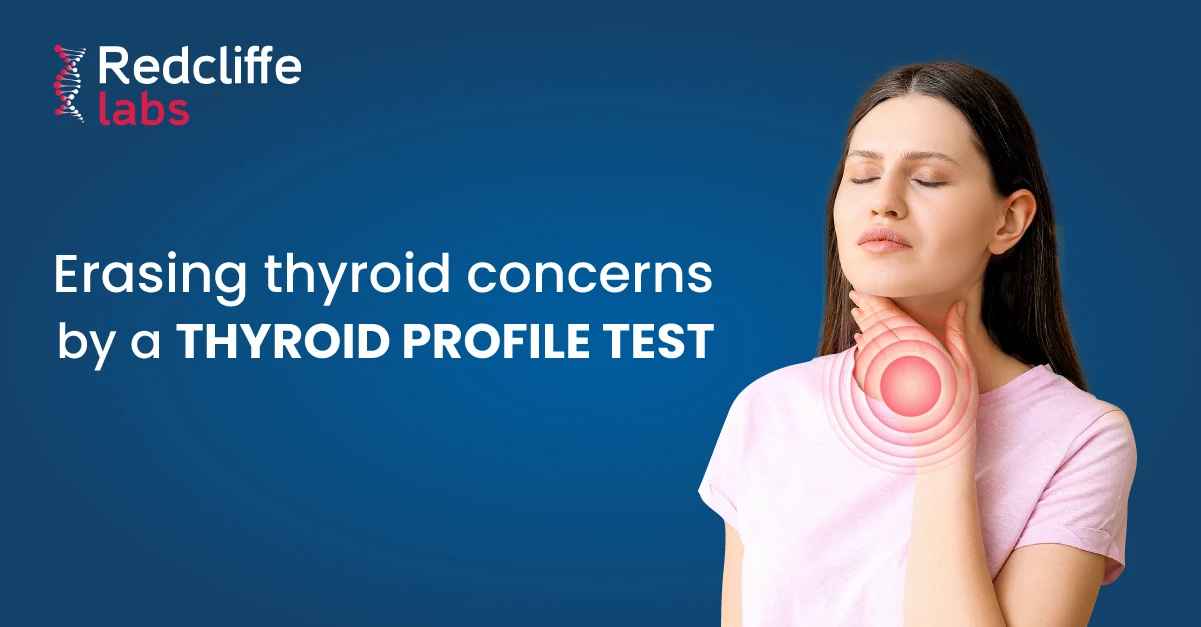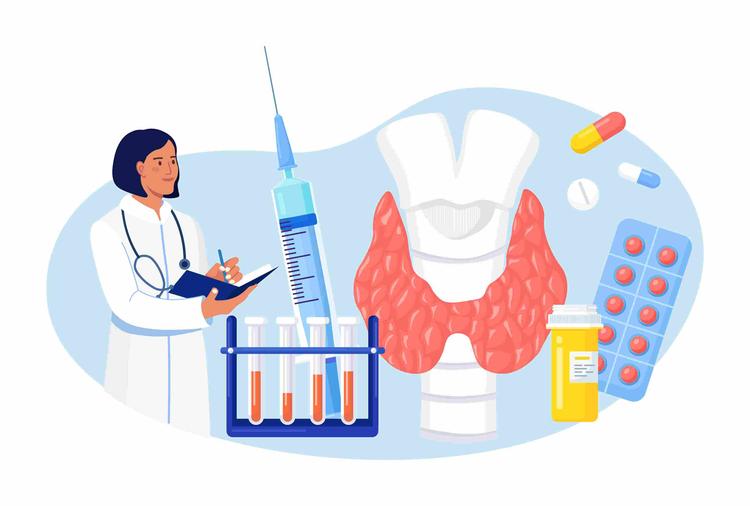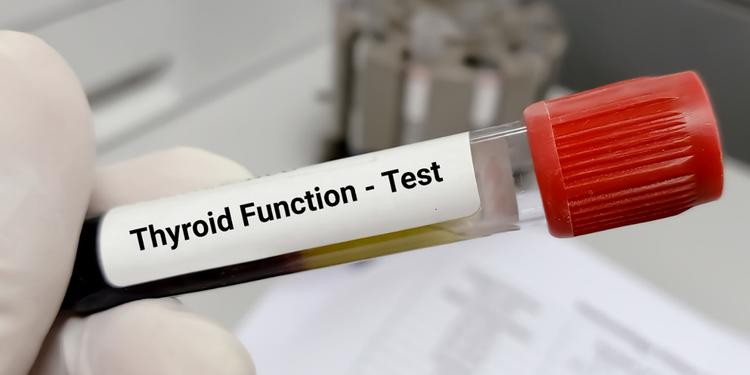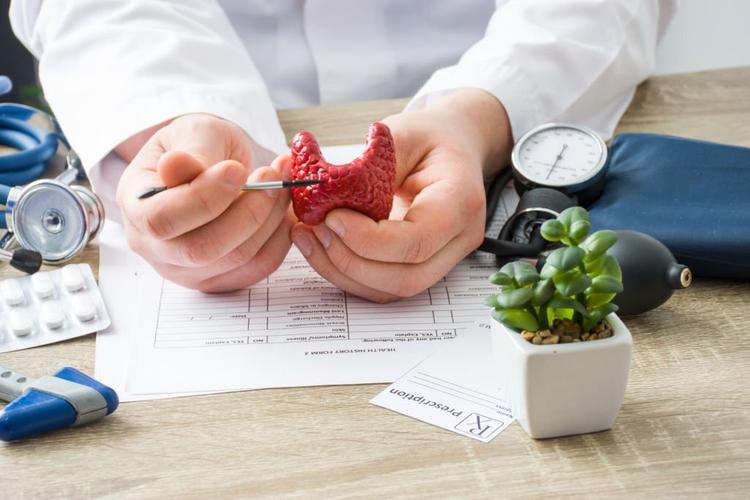Erasing Thyroid Concerns by a Thyroid Profile test

Medically Reviewed By
Dr Divya Rohra
Written By Meenakshi
on May 10, 2022
Last Edit Made By Meenakshi
on Jan 9, 2025

Thyroid disease is a very common clinical condition in which the thyroid gland starts to behave abnormally. There are so many people around us who are suffering from thyroid disorders. That may include our neighbors, family members, and friends. The disease is more commonly found among females and is chiefly responsible for hormonal imbalance and weight gain.
It is a butterfly-shaped organ that exists at the base of the larynx (below Adam’s apple) of the neck along the windpipe or trachea and secretes vital hormones that play an important role in growth, development, and metabolism. The gland constantly releases thyroid hormone into the blood to regulate various body functions, including heart rate, muscle strength, controlling various activities of the nervous system, body weight, breathing, body temperature, menstrual cycle in women, and much more.
Our thyroid gland produces the exact amount of thyroid hormone needed for normal functions and metabolism, but it secretes too much or too little amounts of triiodothyronine (T3) and thyroxine (T4) hormone when it starts working abnormally. Iodine is needed by the thyroid gland to make thyroid-secreting hormones.
On this basis, the thyroid problem is divided into 2 types of disorders. The first is hyperthyroidism, and the other one is hypothyroidism, as given below.
1. Hyperthyroidism
In this situation, an overactive or hyperactive thyroid makes too much thyroid hormones (T4, T3) but less TSH. This leads to various symptoms, including weight loss, high blood pressure, rapid heartbeat, increased appetite, diarrhea, irritability, bulging eyes, brittle nails, and hair.
Grave's disease is related to hyperthyroidism. It is an autoimmune disease in which the body’s own immune system starts attacking the thyroid gland, and in such a situation, the thyroid gland starts producing more quantities of thyroid hormone. Risk factors that can cause Grave’s disease include pregnancy, smoking, stress, family history of such illness, etc.
2. Hypothyroidism
This condition is the exact opposite of hyperthyroidism, in which the thyroid gland secretes insufficient amounts of thyroid hormones (T4 and T3) but produces more TSH. This condition gives rise to certain symptoms like weakness, fatigue, low appetite, constipation, weight gain, memory problems, mood swings, and much more.
Hashimoto’s Thyroiditis is caused by hypothyroidism, which is more common in women and can occur in any age group. It is also an autoimmune disorder in which the body’s own immune system destroys the hormone-producing ability of the thyroid glands. And it gives rise to symptoms similar to hypothyroidism.
Goiter : A goiter is an abnormal enlargement of the thyroid gland that is caused by an iodine deficiency. This disease can affect anyone at any age, but such growth does not come under the cancerous type. Swelling in the neck, rough and hoarse voice, wheezing, difficult breathing, etc. are some of the main symptoms of goiter.
Thyroid cancer : In the case of thyroid cancer, cells start to grow uncontrollably, and it is more common in females than males. Certain risk factors can increase the chance of thyroid cancer, including family history, exposure to high radiation, heredity disorders, being overweight or obese.
If you are concerned about thyroid disorders, you can avail of the comprehensive services for thyroid blood tests at Redcliffe Labs.
Risk Factors Associated With Thyroid Disorders
Some important risk factors which contribute to thyroid abnormalities are:
- Family history
- Pregnancy
- Injury to the thyroid gland
- And certain medications like iodine and lithium
- Smoking and stress
Diagnosing Thyroid Problems
Changes in weight and sleep, mood swings, changes in bowel movement, lumps or swelling in the thyroid gland, and pain around the thyroid area are all symptoms of thyroid abnormalities. Therefore, for such symptoms and after physical examination, the doctor can recommend certain tests to detect and confirm thyroid-related disorders.
Thyroid Function Test Procedure
The whole test procedure is very simple. As usual, a well-trained phlebotomist draws blood from the arm and sends the blood sample to the pathology lab for diagnosing any disorder or disease. No specific preparation is required for the thyroid profile test, like overnight fasting, and it can be done any time of day. There are also no side effects from the test except minor discomfort and bruising at the site of the needle prick.
Thyroid Profile Test:
The thyroid profile test is a series of tests that measure the levels of thyroid hormones in the blood. The test detects the amounts of thyroxine (T4), triiodothyronine (T3), and the level of Thyroid Stimulating Hormone (TSH) in a blood sample. In the case of hypo-or hyperthyroidism symptoms, this test gives valuable information about the abnormal functioning of the thyroid gland.
- Thyroxine (T4) test: This test measures both free and bound thyroxine levels, and the freely available form affects the body's functions more.
- Triiodothyronine (T3) test: this test also measures free and bound T3 levels, and in hyperthyroid conditions, total T3 levels are often found elevated. Results of this test also help in detecting the severity of thyroid disease.
- Thyroid Stimulating Hormone (TSH) TestThis hormone is secreted and produced by the pituitary gland in the brain, and TSH regulates both the hormones thyroxine (T4) and triiodothyronine (T3). Any fluctuations in the TSH (thyroid-stimulating hormone) level show that the pituitary gland is also not functioning properly.
Test Results
- Low levels of triiodothyronine (T3) and thyroxine (T4) hormones but a high level of TSH indicate hypothyroidism.
- High levels of triiodothyronine (T3) and thyroxine (T4) hormones but a low level of TSH indicate hyperthyroidism.
- Normal range of T3 levels: Between 100 - 200 ng/dL (nanograms per deciliter)
- Normal range of T3 levels: Between 5.0 -12.0 ng/dL (nanograms per deciliter)
How To Get The Test Done Easily?
The Thyroid profile test is easily accessible and reasonably priced at Redcliffe Labs, a well-known chain of pathology labs in India. The company offers all the tests in the comfort of your home with a free sample collection facility. The precise test report can be collected on the same day of the test.
Disclaimer:The blog content has been posted as a piece of information and awareness only. The content provided in this blog, or in any linked materials, are not proposed and should not be taken as medical advice. Redcliffe Labs strongly recommends users to consult with their health care providers to make any medical or health-related decision.


